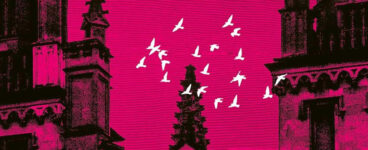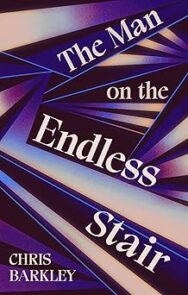‘I reached out with my good arm and held it inches from the doorknob. What would I find on the other side? I stepped back from the door, began to breathe deep and ragged breaths. No one else was coming. Had the wind and rain obscured the sound? Or perhaps I’d misheard, panicked over nothing?’
The Man on the Endless Stair is a literary thriller with puzzles upon puzzles as a young, fledgling writer, Euan, tries to solve the murder of his mentor, the celebrated novelist Malcolm Furnivall. Here is an extract that gives a flavour of the nightmareish quality of Malcolm’s secluded house.
The Man on the Endless Stair
By Chris Barkley
Published by Polygon
As the door swung shut behind Malcolm, I stared down at my arm, to the sign of the omphalos. It was black and swollen. I didn’t feel any different. I believed magical thinking to be the domain of the child and the old man – a desire for significance in an unfeeling world, a way to control the overwhelming tide of being. This was the reason I supposed Malcolm had built this estate. It was a spell, wrought of plaster and stone, to hold him long after his death; it was furnished with scenes from his books, curiosities, strange paintings and puzzles. You could walk through the mansion with a Gravitation book in your hand and see references to every chapter. During my visits, Malcolm had proved to be a man obsessed with making his mark. And now, he’d made it on me.
Trying to distract myself from the pain, I moved away from the desk to the record collection, flicking through till I came across one of Anwen’s first performances: Mendelssohn’s Violin Concerto in E minor. She’d performed it at Carnegie Hall with the London Symphony Orchestra. I took out the vinyl, set it on the record player and waited, closing my eyes as the first notes of Anwen’s violin sang over the low thrum of the orchestra. Her violin was a cold mist encircling the orchestra’s dark and looming island. I let the record play as I moved through the study. On the walls were more images which, when looked at briefly, seemed unremarkable, but when examined, revealed a discordance. There were tessellations in which simple shapes interlocked and wove until they created a greater creature, nebulous and strange. There were images of endless waterfalls, and prisons of perspective which trapped those inside in an impossible maze.
As Anwen’s singing mist whipped into a flurry, and the dark island of the orchestra rose, I found myself drawn to one image. It was of two faces, turned to each other. They were unravelling together, and under their skin was not muscle and bone, but rather a swirling system of planets and stars.
Again, unwanted memories rose in me. I recalled my sister’s voice, gentle but strong. And then I felt her, resting her head on my shoulder. I recalled what Malcolm had said about me lacking something.
Bringing my hand to my shoulder, the feeling went, and so I turned my attention back to the room, walking over to the glass cabinet of little figures. I looked inside and was struck by their beauty; some of ivory, some of wood, intricate and polished to perfection. There was a sleeping cat, and, in its ears, I could see each of the individual hairs. Beside it was a stag, with antlers that branched like forked lightning. There was a man, bending over a well, staring down into the depths as if he had lost something and forgotten what it was. As I turned my gaze to another figure, I wondered who in Malcolm’s family collected the little sculptures. Malcolm had never told me.
Anwen’s playing conjured a sense of motion, as if every particle in the air were livid and sparking. I saw, in the jade eyes of a sculpted mouse, a fire which flickered over the patinaed hides of the other figures. Then, those eyes seemed to turn to the window. I followed their gaze.
There, watching me from outside, was a girl.
I stepped back, tripping on the carpet, steadying myself on the adjacent wall.
She blinked, making no move to run away. The long grass was up to her waist and the gentle misting rain had caused her dark hair to cling to her forehead in lank strands. Her face was heart-shaped, familiar . . .
‘No,’ I said. ‘You’re gone.’
The girl wore a white gown, torn and muddy at the sleeves and hem. She looked serene. The wind mussed the grass about her, but seemed to leave her be, as if she, herself, were an element to be feared.
Moving over to the window and placing my hand against the glass, I watched her and waited, the same way you might wait for a beautiful dream to fade. She seemed to look through me, but when I waved for her to come inside, she met my eye. And there was recognition, I could sense it. But it couldn’t be my Julia . . . She would be older now.
The girl in the white gown shook her head. I saw her clenching and unclenching her fists. Her eyes flicked behind me, to the cabinet of sculptures. She seemed to be more interested in them than me.
‘Do you want one?’ I said, pointing to the sculptures. I went to the cabinet and ran my finger along the shelves, stopped when I saw her eyes light up. She gazed at where my finger was poised: a pair of otters, forming a circle with their sinuous bodies. ‘This one?’ I said.
She looked back at me. Fear marked her face.
A sound. I turned in its direction; it had come from the other side of the house. Time seemed to slow as dread sank through me. It was a shot. A single one, followed by silence.
I looked back through the window to where the girl had been standing, but she was gone. In her place, only the afternoon gloom and long grass, stippled with white wildflowers. Had they been there before?
I left the study with the record player still turning, rushed out into the hallway, across a wide foyer, weaving between staircases. I still found it difficult to orient myself in the house Malcolm had designed; like his books, it was near impossible to hold its entirety in your mind; rather, you had to let it pull you where it willed.
As I ran, I felt my blood coursing to the wound on my arm, pounding at the symbol, as if trying to beat it from my skin. I was the first person who came to the tall oak door of the sitting room, where Malcolm had gone to get the ice.
Facing the door, I froze. My gaze ran across the woodgrain as my thoughts drifted to the last time I’d heard gunshots. They had been all around, setting the wind alight. But now, this single shot had its own kind of horror. The silence about it had put the terrible sound in sharp relief. It held a meaning. A gunshot in silence is a scar on the face of a child.
I reached out with my good arm and held it inches from the doorknob. What would I find on the other side? I stepped back from the door, began to breathe deep and ragged breaths. No one else was coming. Had the wind and rain obscured the sound? Or perhaps I’d misheard, panicked over nothing?
‘Malcolm?’ I said.
Silence.
Wind against a distant window made me flinch. I resumed my breathing, called out for Malcolm again.
This time, when he didn’t reply, I gripped the doorknob, turned and pushed.
The door jolted in its frame.
‘Malcolm!’
Someone had locked the door. I pushed again but it didn’t move.
‘Malcolm, open the door, for God’s sake.’
Stepping away, I cast about for help of any kind, but found only the vaulted ceiling, dark plum carpets, stained-glass windows. The house swallowed my voice, regurgitated it throughout its many rooms.
The Man on the Endless Stair by Chris Barkley is published by Polygon, priced £14.99.
ALSO IN THIS ISSUE

 These Mortal Bodies: A Q & A with Elspeth Wilson
These Mortal Bodies: A Q & A with Elspeth Wilson
‘Something I love about dark academia is a genre is that the characters are so flawed, and yet (near …

 Women Who Dared: From the Infamous the Forgotten
Women Who Dared: From the Infamous the Forgotten
‘”Men have made a more comfortable world for boys and men than for girls and women; and the women no …













